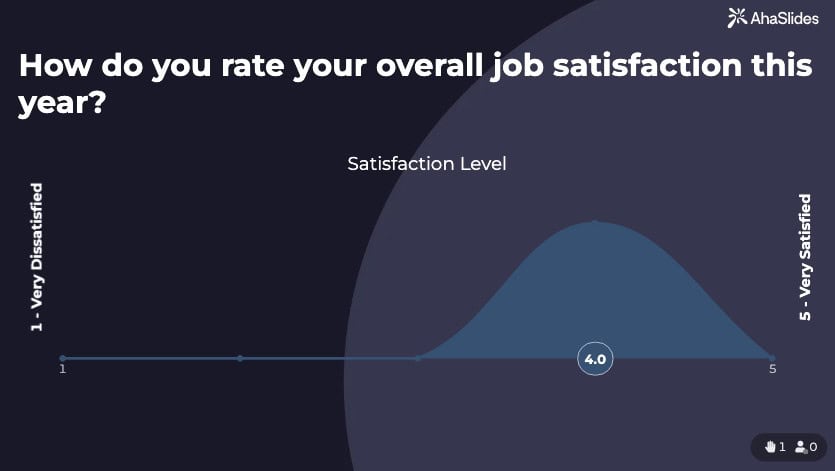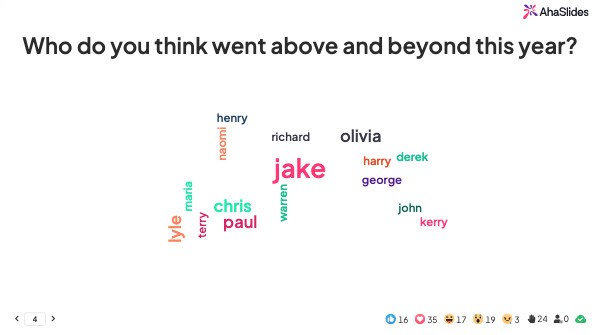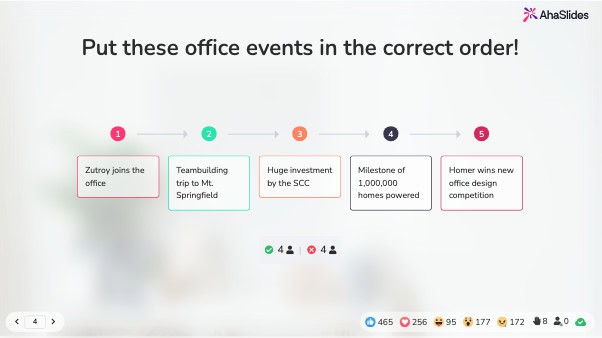Most organisations treat year-end reviews as a necessary evil—a box-ticking exercise that everyone rushes through in December.
But here's what they're missing: when done properly, these conversations become one of your most valuable tools for unlocking potential, strengthening teams, and driving business results. The difference between a perfunctory review and a transformative one isn't more time—it's better preparation.
This comprehensive guide provides step-by-step frameworks, 50+ practical phrases, real-world examples across different contexts, and expert tips to help you create year-end reviews that drive meaningful conversations and measurable improvements

Table of Contents
How to write a year-end review: step-by-step framework
Step 1: Gather your materials
Before you start writing, collect:
- Performance metrics: Sales figures, project completion rates, customer satisfaction scores, or any quantifiable achievements
- Feedback from others: Peer reviews, manager notes, client testimonials, or 360-degree feedback
- Project documentation: Completed projects, presentations, reports, or deliverables
- Learning records: Training completed, certifications earned, skills developed
- Reflection notes: Any personal notes or journal entries from throughout the year
Pro tip: Use AhaSlides' survey feature to collect anonymous feedback from colleagues before your review. This provides valuable perspectives you might not have considered.
Step 2: Reflect on achievements
Use the STAR method (Situation, Task, Action, Result) to structure your achievements:
- Situation: What was the context or challenge?
- Task: What needed to be accomplished?
- Action: What specific actions did you take?
- Result: What was the measurable outcome?
Example framework:
- Quantify your impact (numbers, percentages, time saved)
- Connect achievements to business objectives
- Highlight collaboration and leadership moments
- Show progression and growth
Step 3: Address challenges and areas for improvement
Be honest but constructive: Acknowledge areas where you faced difficulties, but frame them as learning opportunities. Show what you've done to improve and what you plan to do next.
Avoid:
- Making excuses
- Blaming others
- Being overly negative
- Vague statements like "I need to improve communication"
Instead, be specific:
- "I initially struggled with managing multiple project deadlines. I've since implemented a time-blocking system and improved my completion rate by 30%."
Step 4: Set goals for the upcoming year
Use SMART criteria:
- Specific: Clear, well-defined objectives
- Measurable: Quantifiable success metrics
- Achievable: Realistic given resources and constraints
- Relevant: Aligned with role, team, and company goals
- Time-bound: Clear deadlines and milestones
Goal categories to consider:
- Skill development
- Project leadership
- Collaboration and teamwork
- Innovation and process improvement
- Career advancement
Step 5: Request feedback and support
Be proactive: Don't wait for your manager to provide feedback. Ask specific questions about:
- Areas where you can grow
- Skills that would make you more effective
- Opportunities for increased responsibility
- Resources or training that would help

Year-end review examples
Personal year-end review example
Context: Individual reflection for career development
Achievements section:
"This year, I successfully led the digital transformation initiative for our customer service department, resulting in a 40% reduction in average response time and a 25% increase in customer satisfaction scores. I managed a cross-functional team of eight people, coordinating between IT, operations, and customer service teams to ensure seamless implementation.
I also completed my certification in Agile Project Management and applied these methodologies to three major projects, improving our project completion rate by 20%. Additionally, I mentored two junior team members, both of whom have since been promoted to senior roles."
Challenges and growth section:
"Early in the year, I struggled with balancing multiple high-priority projects simultaneously. I recognised this as an area for development and enrolled in a time management course. I've since implemented a prioritisation framework that has helped me manage my workload more effectively. I'm continuing to refine this skill and would appreciate any additional resources or training in advanced project management."
Goals for next year:
"1. Lead at least two cross-departmental initiatives to expand my influence and visibility across the organisation
- Complete advanced training in data analytics to better support data-driven decision making
- Develop my public speaking skills by presenting at two industry conferences
- Take on a formal mentoring role in our company's mentorship programme"
Support needed:
"I would benefit from access to advanced analytics tools and training, as well as opportunities to present to senior leadership to develop my executive communication skills."
Employee year-end review example
Context: Employee self-appraisal for performance review
Achievements section:
"In 2025, I exceeded my sales targets by 15%, closing deals worth £2.3 million compared to my target of £2 million. I achieved this through a combination of expanding relationships with existing clients (which generated 60% of my revenue) and successfully acquiring 12 new enterprise clients.
I also contributed to team success by sharing best practices in our monthly sales meetings and creating a client onboarding checklist that has been adopted by the entire sales team. This has reduced onboarding time by an average of three days per client."
Areas for improvement section:
"I've identified that I can improve my follow-up process with prospects. Whilst I'm strong at initial outreach and closing, I sometimes lose momentum in the middle stages of the sales cycle. I've started using a CRM automation tool to address this and would welcome coaching on advanced sales techniques for nurturing longer sales cycles."
Goals for next year:
"1. Achieve £2.5 million in sales (8% increase from this year's results)
- Develop expertise in our new product line to expand into new market segments
- Improve my win rate from 35% to 40% through better qualification and follow-up
- Mentor one new sales team member to support team growth"
Development requests:
"I would like to attend the annual sales conference and participate in advanced negotiation training to further develop my skills."
Manager year-end review example
Context: Manager conducting team member's review
Employee achievements:
"Sarah has demonstrated exceptional growth this year. She successfully transitioned from individual contributor to team lead, managing a team of five people whilst maintaining her own high-quality output. Her team achieved 100% project completion on time, and team satisfaction scores increased by 35% under her leadership.
She also took the initiative to implement a new project management system that has improved cross-team collaboration and reduced project delays by 20%. Her proactive approach to problem-solving and her ability to motivate her team have made her a valuable asset to the department."
Areas for development:
"Whilst Sarah excels at day-to-day team management, she could benefit from developing her strategic thinking skills. She tends to focus on immediate tasks and could strengthen her ability to see the bigger picture and align team activities with long-term business objectives. I recommend she participate in our leadership development programme and take on a cross-functional project to broaden her perspective."
Goals for next year:
"1. Lead a cross-functional initiative to develop strategic thinking and visibility
- Develop one team member to promotion-ready status
- Present quarterly business reviews to senior leadership to develop executive communication
- Complete the advanced leadership certification programme"
Support and resources:
"I will provide opportunities for Sarah to work on strategic projects, connect her with senior leaders for mentorship, and ensure she has access to the leadership development resources she needs."
Business year-end review example
Context: Organisational performance review
Financial performance:
"This year, we achieved revenue of £12.5 million, representing 18% growth year-over-year. Our profit margins improved from 15% to 18% through operational efficiency improvements and strategic cost management. We successfully expanded into two new markets, which now represent 25% of our total revenue."
Operational achievements:
"We launched our new customer portal, resulting in a 30% reduction in support ticket volume and a 20% increase in customer satisfaction. We also implemented a new inventory management system that reduced stockouts by 40% and improved our order fulfilment time by 25%."
Team and culture:
"Employee retention improved from 85% to 92%, and our employee engagement scores increased by 15 points. We launched a comprehensive professional development programme that saw 80% of employees participate in at least one training opportunity. We also strengthened our diversity and inclusion initiatives, increasing representation in leadership roles by 10%."
Challenges and lessons learned:
"We faced supply chain disruptions in Q2 that affected our delivery timelines. In response, we diversified our supplier base and implemented a more robust risk management process. This experience taught us the importance of building resilience into our operations."
Goals for next year:
"1. Achieve 20% revenue growth through market expansion and new product launches
- Improve customer retention rate from 75% to 80%
- Launch our sustainability initiative with measurable environmental impact goals
- Expand our team by 15% to support growth whilst maintaining our culture
- Achieve industry recognition for innovation in our sector"
Strategic priorities:
"Our focus for the coming year will be on digital transformation, talent development, and sustainable growth. We'll invest in technology infrastructure, expand our learning and development programmes, and implement our new sustainability framework."
50+ year-end review phrases
Phrases for achievements
Quantifying impact:
- "Exceeded [target] by [percentage/amount], resulting in [specific outcome]"
- "Achieved [metric] that was [X]% above target"
- "Delivered [project/initiative] that generated [quantifiable result]"
- "Improved [metric] by [percentage] through [specific action]"
- "Reduced [cost/time/error rate] by [amount/percentage]"
Leadership and collaboration:
- "Successfully led [team/project] that achieved [outcome]"
- "Collaborated with [teams/departments] to deliver [result]"
- "Mentored [number] team members, [X] of whom have been promoted"
- "Facilitated cross-functional collaboration that resulted in [outcome]"
- "Built strong relationships with [stakeholders] that enabled [achievement]"
Innovation and problem-solving:
- "Identified and resolved [challenge] that was impacting [area]"
- "Developed innovative solution for [problem] that [result]"
- "Streamlined [process] resulting in [time/cost savings]"
- "Introduced [new approach/tool] that improved [metric]"
- "Took initiative to [action] which led to [positive outcome]"
Phrases for areas of improvement
Acknowledging challenges constructively:
- "I initially struggled with [area] but have since [action taken] and seen [improvement]"
- "I recognised [challenge] as an opportunity for growth and have [steps taken]"
- "Whilst I've made progress in [area], I'm continuing to develop [specific skill]"
- "I've identified [area] as a focus for next year and plan to [specific actions]"
- "I'm working on improving [skill] through [method] and would benefit from [support]"
Requesting support:
- "I would appreciate additional training in [area] to further develop [skill]"
- "I believe [resource/training/opportunity] would help me excel in [area]"
- "I'm seeking opportunities to [action] to strengthen [skill/area]"
- "I would benefit from mentorship in [area] to accelerate my development"
- "I'm interested in [development opportunity] to support my growth in [area]"
Phrases for goal setting
Professional development goals:
- "I plan to develop expertise in [skill/area] through [method] by [timeline]"
- "My goal is to [achievement] by [date] by focusing on [specific actions]"
- "I aim to strengthen [skill] by [method] and measure success through [metric]"
- "I'm committed to [development area] and will track progress through [method]"
- "I will pursue [certification/training] to enhance [skill] and apply it to [context]"
Performance goals:
- "I'm targeting [metric] improvement in [area] through [strategy]"
- "My objective is to [achievement] by [date] by [specific approach]"
- "I plan to exceed [target] by [percentage] through [methods]"
- "I'm setting a goal to [outcome] and will measure success via [metrics]"
- "I aim to [achievement] which will contribute to [business objective]"
Phrases for managers conducting reviews
Recognising achievements:
- "You've demonstrated exceptional [skill/quality] in [context], resulting in [outcome]"
- "Your contribution to [project/initiative] was instrumental in [achievement]"
- "You've shown strong growth in [area], particularly in [specific example]"
- "Your [action/approach] has had a positive impact on [team/metric/outcome]"
- "You've exceeded expectations in [area] and I appreciate your [quality]"
Providing constructive feedback:
- "I've noticed you excel at [strength] and there's an opportunity to develop [area]"
- "Your [strength] is valuable, and I believe focusing on [development area] would enhance your impact"
- "I'd like to see you take on more [type of responsibility] to develop [skill]"
- "You've made good progress in [area], and I think [next step] would be the natural progression"
- "I recommend [development opportunity] to help you achieve [goal]"
Setting expectations:
- "For next year, I'd like you to focus on [area] with a goal of [outcome]"
- "I see an opportunity for you to [action] which aligns with [business objective]"
- "Your development plan should include [area] to prepare you for [future role/responsibility]"
- "I'm setting a goal for you to [achievement] by [timeline]"
- "I expect you to [action] and will support you through [resources/training]"
Common mistakes to avoid in year-end reviews
Mistake 1: Being too vague
Bad example: "I did well this year and completed my projects."
Good example: "I successfully completed 12 client projects this year, with an average satisfaction score of 4.8/5.0. Three projects were completed ahead of schedule, and I received positive feedback from [specific clients]."
Mistake 2: Only focusing on achievements
Problem: Reviews that only highlight successes miss opportunities for growth and development.
Solution: Balance achievements with honest reflection on challenges and areas for improvement. Show that you're self-aware and committed to continuous learning.
Mistake 3: Blaming others for challenges
Bad example: "I couldn't complete the project because the marketing team didn't provide materials on time."
Good example: "The project timeline was impacted by delayed materials from the marketing team. I've since implemented a weekly check-in process with stakeholders to prevent similar issues and ensure better coordination."
Mistake 4: Setting unrealistic goals
Problem: Goals that are too ambitious can set you up for failure, whilst goals that are too easy don't drive growth.
Solution: Use the SMART framework to ensure goals are specific, measurable, achievable, relevant, and time-bound. Discuss goals with your manager to ensure alignment.
Mistake 5: Not requesting specific support
Bad example: "I'd like to improve my skills."
Good example: "I'd like to develop my data analysis skills to better support our reporting needs. I'm requesting access to the advanced Excel training course and would appreciate opportunities to work on projects that require data analysis."
Mistake 6: Ignoring feedback from others
Problem: Only including your own perspective misses valuable insights from colleagues, clients, or team members.
Solution: Actively seek feedback from multiple sources. Use 360-degree feedback tools or simply ask colleagues for their perspectives on your performance.
Mistake 7: Writing it at the last minute
Problem: Rushed reviews lack depth, miss important achievements, and don't allow time for reflection.
Solution: Start gathering materials and reflecting on your year at least two weeks before your review. Keep notes throughout the year to make this process easier.
Mistake 8: Not connecting to business objectives
Problem: Reviews that focus only on individual tasks miss the bigger picture of how your work contributes to organisational success.
Solution: Explicitly connect your achievements to business goals, team objectives, and company values. Show how your work creates value beyond your immediate responsibilities.
Year-end review for managers: how to conduct effective reviews
Preparing for the review meeting
Gather comprehensive information:
- Review the employee's self-appraisal
- Collect feedback from peers, direct reports (if applicable), and other stakeholders
- Review performance metrics, project outcomes, and goal completion
- Note specific examples of achievements and areas for development
- Prepare questions to facilitate discussion
Create a safe environment:
- Schedule sufficient time (at least 60-90 minutes for a comprehensive review)
- Choose a private, comfortable location (or ensure virtual meeting privacy)
- Minimise distractions and interruptions
- Set a positive, collaborative tone
During the review meeting
Structure the conversation:
- Start with positives (10-15 minutes)
- Recognise achievements and contributions
- Be specific with examples
- Show appreciation for effort and results
- Discuss development areas (15-20 minutes)
- Frame as growth opportunities, not failures
- Provide specific examples and context
- Ask for the employee's perspective
- Collaborate on solutions
- Set goals together (15-20 minutes)
- Discuss employee's career aspirations
- Align individual goals with team and company objectives
- Use SMART criteria
- Agree on success metrics
- Plan support and resources (10-15 minutes)
- Identify training, mentorship, or resources needed
- Commit to specific actions you'll take
- Set follow-up check-ins
- Document agreements
Communication tips:
- Use "I" statements: "I observed..." rather than "You always..."
- Ask open-ended questions: "How do you think that project went?"
- Listen actively and take notes
- Avoid comparisons to other employees
- Focus on behaviours and outcomes, not personality
After the review meeting
Document the review:
- Write a summary of key discussion points
- Document agreed-upon goals and action items
- Note commitments you've made (training, resources, support)
- Share the written summary with the employee for confirmation
Follow through on commitments:
- Schedule the training or resources you promised
- Set up regular check-ins to track progress on goals
- Provide ongoing feedback, not just at year-end
- Recognise progress and course-correct as needed
Using AhaSlides for interactive year-end reviews
Pre-review surveys: Use AhaSlides' survey feature to collect anonymous feedback from colleagues before the review. This provides comprehensive 360-degree feedback without the awkwardness of direct requests.
Review meeting engagement: During virtual review meetings, use AhaSlides to:
- Polls: Check understanding and gather quick feedback on discussion points
- Word Cloud: Visualise key achievements or themes from the year
- Q&A: Allow anonymous questions during the review discussion
- Quiz: Create a self-assessment quiz to guide reflection

Team year-end reviews: For team-wide reflection sessions:
- Use the "End of Year Meeting" template to facilitate group discussions
- Collect team achievements via Word Cloud
- Run polls on team goals and priorities for next year
- Use Spinner Wheel to randomly select discussion topics

Celebration and recognition: Use the "Company Year End Celebration" template to:
- Recognise team achievements visually
- Collect nominations for various awards
- Facilitate fun reflection activities
- Create memorable moments for remote teams

Frequently asked questions
What should I include in my year-end review?
Your year-end review should include:
Achievements: Specific accomplishments with quantifiable results
Challenges: Areas where you faced difficulties and how you addressed them
Growth: Skills developed, learning completed, progress made
Goals: Objectives for the upcoming year with clear metrics
Support needed: Resources, training, or opportunities that would help you succeed
How do I write a year-end review if I didn't meet my goals?
Be honest and constructive:
+ Acknowledge what wasn't achieved and why
+ Highlight what you did accomplish, even if it wasn't the original goal
+ Show what you learned from the experience
+ Demonstrate how you've addressed the challenges
+ Set realistic goals for the upcoming year based on lessons learned
What's the difference between a year-end review and a performance review?
Year-end review: Typically a comprehensive reflection on the entire year, including achievements, challenges, growth, and future goals. Often more holistic and forward-looking.
Performance review: Usually focuses on specific performance metrics, goal completion, and evaluation against job requirements. Often more formal and tied to compensation or promotion decisions.
Many organisations combine both into a single annual review process.
How do I give constructive feedback in a year-end review?
Use the SBI framework (Situation, Behaviour, Impact):
+ Situation: Describe the specific context
+ Behaviour: Describe the observable behaviour (not personality traits)
+ Impact: Explain the effect of that behaviour
Example: "During the Q3 project (situation), you consistently met deadlines and proactively communicated updates (behaviour), which helped the team stay on track and reduced stress for everyone (impact)."
What if my manager doesn't give me a year-end review?
Be proactive: Don't wait for your manager to initiate. Request a review meeting and come prepared with your own self-appraisal.
Use HR resources: Reach out to HR for guidance on the review process and to ensure you receive proper feedback.
Document your achievements: Keep your own records of accomplishments, feedback, and goals regardless of whether a formal review happens.
Consider it a red flag: If your manager consistently avoids reviews, it may indicate broader management issues worth addressing.








